电子模块|心率血氧传感器模块MAX30102及其驱动代码
实物照片
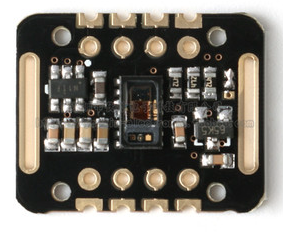
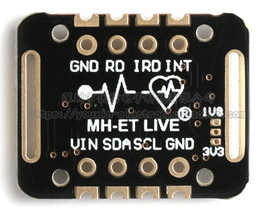
模块简介
MAX30102是一个集成的脉搏血氧仪和心率监测仪生物传感器的模块。
它集成了一个红光LED和一个红外光LED、光电检测器、光器件,以及带环境光抑制的低噪声电子电路。
MAX30102采用一个1.8V电源和一个独立的5.0V用于内部LED的电源,应用于可穿戴设备进行心率和血氧采集检测,佩戴于手指点耳垂和手腕处。
标准的I2C兼容的通信接口可以将采集到的数值传输给Arduino、KL25Z、STM32、STC51等单片机进行心率和血氧计算。
此外,该芯片还可以通过软件关断模块,待机电流接近为零,实现电源始终维持供电状态。
主要参数:
产品名称MAX30102 心率模块LED峰值波长器660nm/880nmLED供电电压3.3 ~ 5V检测信号类型光反射信号(PPG)输出信号接口I2C接口通信接口电压1.8 ~ 3.3V ~ 5V(可选)
产品尺寸: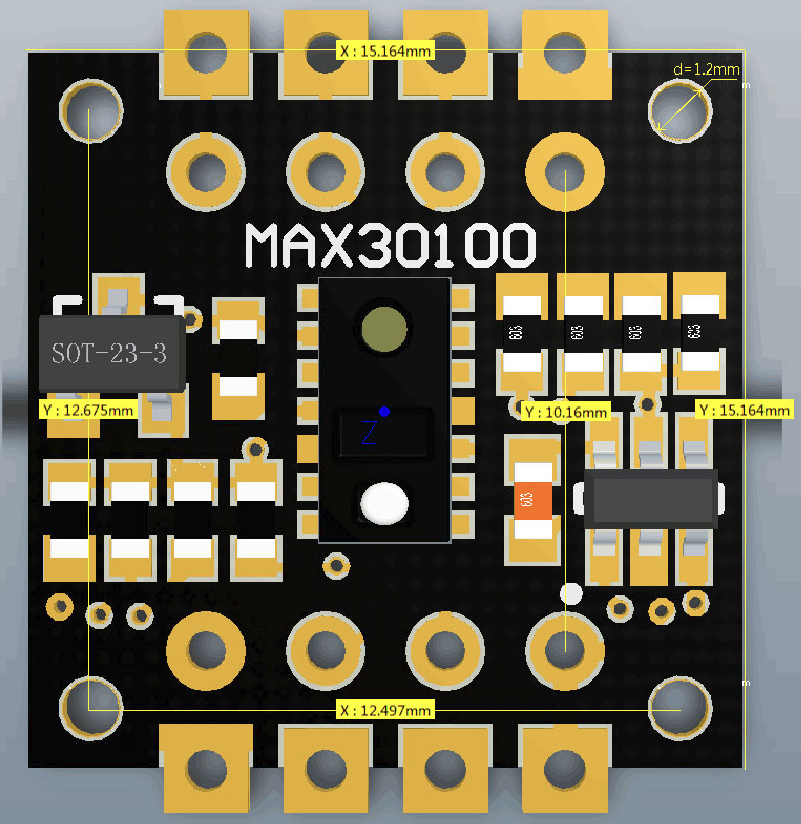
工作原理
光溶积法:利用人体组织在血管搏动时造成透光率不同来进行脉搏和血氧饱和度测量
光源:采用对动脉血中痒合血红蛋白(HbO2)和血红蛋白(Hb)有选择性的特定波长的发光二极管
透光率转化为电信号:动脉搏动充血容积变化导致这束光的透光率发送改变,此时由光电变换接收经人体组织反射光线,转变为电信号并将其放大输出。
原理图及引脚说明
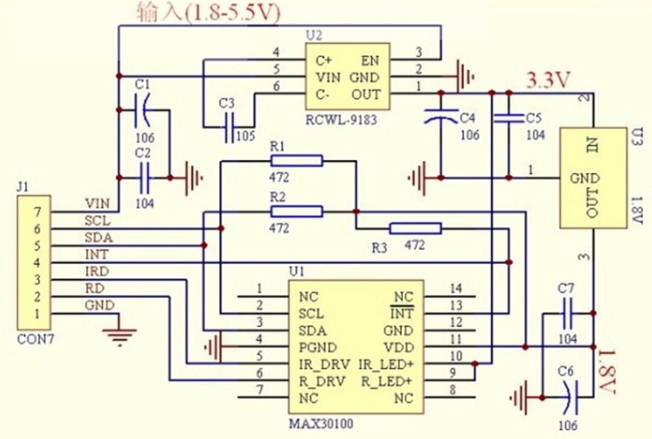

引脚说明
名称管教定义VIN电源输入 1.6V-5.5V3位焊盘选择总线的上拉电平,取决于引脚主控电压可选1.8v或者3.3vSDAIIC-SDASCLIIC-SCLGND地INTINT 低电平有效中断(漏极开路)MAX30102 的中断引脚IRDIR_DRV IR LED阴极和LED驱动器连接点 一般不接RDR_DRV 红色LED阴极和LED驱动器连接点 一般不接
STM32软件驱动
使用STM32F103C8T6最小系统开发板验证。
接线如下:
MAX30102模块接口:PB9-SDA,PB8-SCL,PB7-INT
PA2/PA3为串口传输口TX和RX,波特率设置为115200
PC13为显示LED
IIC通信代码
#include"mbed.h"#include"MAX30102.h"
I2C i2c(I2C_SDA, I2C_SCL);//SDA-PB9,SCL-PB8
bool maxim_max30102_write_reg(uint8_t uch_addr,uint8_t uch_data)/**
* \brief Write a value to a MAX30102 register
* \par Details
* This function writes a value to a MAX30102 register
*
* \param[in] uch_addr - register address
* \param[in] uch_data - register data
*
* \retval true on success
*/{char ach_i2c_data[2];
ach_i2c_data[0]=uch_addr;
ach_i2c_data[1]=uch_data;if(i2c.write(I2C_WRITE_ADDR, ach_i2c_data,2, false)==0)return true;elsereturn false;}
bool maxim_max30102_read_reg(uint8_t uch_addr,uint8_t*puch_data)/**
* \brief Read a MAX30102 register
* \par Details
* This function reads a MAX30102 register
*
* \param[in] uch_addr - register address
* \param[out] puch_data - pointer that stores the register data
*
* \retval true on success
*/{char ch_i2c_data;
ch_i2c_data=uch_addr;if(i2c.write(I2C_WRITE_ADDR,&ch_i2c_data,1, true)!=0)return false;if(i2c.read(I2C_READ_ADDR,&ch_i2c_data,1, false)==0){*puch_data=(uint8_t) ch_i2c_data;return true;}elsereturn false;}
bool maxim_max30102_init()/**
* \brief Initialize the MAX30102
* \par Details
* This function initializes the MAX30102
*
* \param None
*
* \retval true on success
*/{if(!maxim_max30102_write_reg(REG_INTR_ENABLE_1,0xc0))// INTR settingreturn false;if(!maxim_max30102_write_reg(REG_INTR_ENABLE_2,0x00))return false;if(!maxim_max30102_write_reg(REG_FIFO_WR_PTR,0x00))//FIFO_WR_PTR[4:0]return false;if(!maxim_max30102_write_reg(REG_OVF_COUNTER,0x00))//OVF_COUNTER[4:0]return false;if(!maxim_max30102_write_reg(REG_FIFO_RD_PTR,0x00))//FIFO_RD_PTR[4:0]return false;if(!maxim_max30102_write_reg(REG_FIFO_CONFIG,0x0f))//sample avg = 1, fifo rollover=false, fifo almost full = 17return false;if(!maxim_max30102_write_reg(REG_MODE_CONFIG,0x03))//0x02 for Red only, 0x03 for SpO2 mode 0x07 multimode LEDreturn false;if(!maxim_max30102_write_reg(REG_SPO2_CONFIG,0x27))// SPO2_ADC range = 4096nA, SPO2 sample rate (100 Hz), LED pulseWidth (400uS)return false;if(!maxim_max30102_write_reg(REG_LED1_PA,0x24))//Choose value for ~ 7mA for LED1return false;if(!maxim_max30102_write_reg(REG_LED2_PA,0x24))// Choose value for ~ 7mA for LED2return false;if(!maxim_max30102_write_reg(REG_PILOT_PA,0x7f))// Choose value for ~ 25mA for Pilot LEDreturn false;return true;}
bool maxim_max30102_read_fifo(uint32_t*pun_red_led,uint32_t*pun_ir_led)/**
* \brief Read a set of samples from the MAX30102 FIFO register
* \par Details
* This function reads a set of samples from the MAX30102 FIFO register
*
* \param[out] *pun_red_led - pointer that stores the red LED reading data
* \param[out] *pun_ir_led - pointer that stores the IR LED reading data
*
* \retval true on success
*/{uint32_t un_temp;unsignedchar uch_temp;*pun_red_led=0;*pun_ir_led=0;char ach_i2c_data[6];//read and clear status registermaxim_max30102_read_reg(REG_INTR_STATUS_1,&uch_temp);maxim_max30102_read_reg(REG_INTR_STATUS_2,&uch_temp);
ach_i2c_data[0]=REG_FIFO_DATA;if(i2c.write(I2C_WRITE_ADDR, ach_i2c_data,1, true)!=0)return false;if(i2c.read(I2C_READ_ADDR, ach_i2c_data,6, false)!=0){return false;}
un_temp=(unsignedchar) ach_i2c_data[0];
un_temp<<=16;*pun_red_led+=un_temp;
un_temp=(unsignedchar) ach_i2c_data[1];
un_temp<<=8;*pun_red_led+=un_temp;
un_temp=(unsignedchar) ach_i2c_data[2];*pun_red_led+=un_temp;
un_temp=(unsignedchar) ach_i2c_data[3];
un_temp<<=16;*pun_ir_led+=un_temp;
un_temp=(unsignedchar) ach_i2c_data[4];
un_temp<<=8;*pun_ir_led+=un_temp;
un_temp=(unsignedchar) ach_i2c_data[5];*pun_ir_led+=un_temp;*pun_red_led&=0x03FFFF;//Mask MSB [23:18]*pun_ir_led&=0x03FFFF;//Mask MSB [23:18]return true;}
bool maxim_max30102_reset()/**
* \brief Reset the MAX30102
* \par Details
* This function resets the MAX30102
*
* \param None
*
* \retval true on success
*/{if(!maxim_max30102_write_reg(REG_MODE_CONFIG,0x40))return false;elsereturn true;}
数值转换代码
#include"algorithm.h"#include"mbed.h"voidmaxim_heart_rate_and_oxygen_saturation(uint32_t*pun_ir_buffer,int32_t n_ir_buffer_length,uint32_t*pun_red_buffer,int32_t*pn_spo2,int8_t*pch_spo2_valid,int32_t*pn_heart_rate,int8_t*pch_hr_valid)/**
* \brief Calculate the heart rate and SpO2 level
* \par Details
* By detecting peaks of PPG cycle and corresponding AC/DC of red/infra-red signal, the ratio for the SPO2 is computed.
* Since this algorithm is aiming for Arm M0/M3. formaula for SPO2 did not achieve the accuracy due to register overflow.
* Thus, accurate SPO2 is precalculated and save longo uch_spo2_table[] per each ratio.
*
* \param[in] *pun_ir_buffer - IR sensor data buffer
* \param[in] n_ir_buffer_length - IR sensor data buffer length
* \param[in] *pun_red_buffer - Red sensor data buffer
* \param[out] *pn_spo2 - Calculated SpO2 value
* \param[out] *pch_spo2_valid - 1 if the calculated SpO2 value is valid
* \param[out] *pn_heart_rate - Calculated heart rate value
* \param[out] *pch_hr_valid - 1 if the calculated heart rate value is valid
*
* \retval None
*/{uint32_t un_ir_mean ,un_only_once ;int32_t k ,n_i_ratio_count;int32_t i, s, m, n_exact_ir_valley_locs_count ,n_middle_idx;int32_t n_th1, n_npks,n_c_min;int32_t an_ir_valley_locs[15];int32_t an_exact_ir_valley_locs[15];int32_t an_dx_peak_locs[15];int32_t n_peak_interval_sum;int32_t n_y_ac, n_x_ac;int32_t n_spo2_calc;int32_t n_y_dc_max, n_x_dc_max;int32_t n_y_dc_max_idx, n_x_dc_max_idx;int32_t an_ratio[5],n_ratio_average;int32_t n_nume, n_denom ;// remove DC of ir signal
un_ir_mean =0;for(k=0; k<n_ir_buffer_length ; k++) un_ir_mean += pun_ir_buffer[k];
un_ir_mean =un_ir_mean/n_ir_buffer_length ;for(k=0; k<n_ir_buffer_length ; k++) an_x[k]= pun_ir_buffer[k]- un_ir_mean ;// 4 pt Moving Averagefor(k=0; k< BUFFER_SIZE-MA4_SIZE; k++){
n_denom=( an_x[k]+an_x[k+1]+ an_x[k+2]+ an_x[k+3]);
an_x[k]= n_denom/(int32_t)4;}// get difference of smoothed IR signalfor( k=0; k<BUFFER_SIZE-MA4_SIZE-1; k++)
an_dx[k]=(an_x[k+1]- an_x[k]);// 2-pt Moving Average to an_dxfor(k=0; k< BUFFER_SIZE-MA4_SIZE-2; k++){
an_dx[k]=( an_dx[k]+an_dx[k+1])/2;}// hamming window// flip wave form so that we can detect valley with peak detectorfor( i=0; i<BUFFER_SIZE-HAMMING_SIZE-MA4_SIZE-2;i++){
s=0;for( k=i; k<i+ HAMMING_SIZE ;k++){
s -= an_dx[k]*auw_hamm[k-i];}
an_dx[i]= s/(int32_t)1146;// divide by sum of auw_hamm }
n_th1=0;// threshold calculationfor( k=0; k<BUFFER_SIZE-HAMMING_SIZE ;k++){
n_th1 +=((an_dx[k]>0)? an_dx[k]:((int32_t)0-an_dx[k]));}
n_th1= n_th1/( BUFFER_SIZE-HAMMING_SIZE);// peak location is acutally index for sharpest location of raw signal since we flipped the signal maxim_find_peaks( an_dx_peak_locs,&n_npks, an_dx, BUFFER_SIZE-HAMMING_SIZE, n_th1,8,5);//peak_height, peak_distance, max_num_peaks
n_peak_interval_sum =0;if(n_npks>=2){for(k=1; k<n_npks; k++)
n_peak_interval_sum +=(an_dx_peak_locs[k]-an_dx_peak_locs[k -1]);
n_peak_interval_sum=n_peak_interval_sum/(n_npks-1);*pn_heart_rate=(int32_t)(6000/n_peak_interval_sum);// beats per minutes*pch_hr_valid =1;}else{*pn_heart_rate =-999;*pch_hr_valid =0;}for( k=0; k<n_npks ;k++)
an_ir_valley_locs[k]=an_dx_peak_locs[k]+HAMMING_SIZE/2;// raw value : RED(=y) and IR(=X)// we need to assess DC and AC value of ir and red PPG. for(k=0; k<n_ir_buffer_length ; k++){
an_x[k]= pun_ir_buffer[k];
an_y[k]= pun_red_buffer[k];}// find precise min near an_ir_valley_locs
n_exact_ir_valley_locs_count =0;for(k=0; k<n_npks ;k++){
un_only_once =1;
m=an_ir_valley_locs[k];
n_c_min=16777216;//2^24;if(m+5< BUFFER_SIZE-HAMMING_SIZE && m-5>0){for(i= m-5;i<m+5; i++)if(an_x[i]<n_c_min){if(un_only_once >0){
un_only_once =0;}
n_c_min= an_x[i];
an_exact_ir_valley_locs[k]=i;}if(un_only_once ==0)
n_exact_ir_valley_locs_count ++;}}if(n_exact_ir_valley_locs_count <2){*pn_spo2 =-999;// do not use SPO2 since signal ratio is out of range*pch_spo2_valid =0;return;}// 4 pt MAfor(k=0; k< BUFFER_SIZE-MA4_SIZE; k++){
an_x[k]=( an_x[k]+an_x[k+1]+ an_x[k+2]+ an_x[k+3])/(int32_t)4;
an_y[k]=( an_y[k]+an_y[k+1]+ an_y[k+2]+ an_y[k+3])/(int32_t)4;}//using an_exact_ir_valley_locs , find ir-red DC andir-red AC for SPO2 calibration ratio//finding AC/DC maximum of raw ir * red between two valley locations
n_ratio_average =0;
n_i_ratio_count =0;for(k=0; k<5; k++) an_ratio[k]=0;for(k=0; k< n_exact_ir_valley_locs_count; k++){if(an_exact_ir_valley_locs[k]> BUFFER_SIZE ){*pn_spo2 =-999;// do not use SPO2 since valley loc is out of range*pch_spo2_valid =0;return;}}// find max between two valley locations // and use ratio betwen AC compoent of Ir & Red and DC compoent of Ir & Red for SPO2 for(k=0; k< n_exact_ir_valley_locs_count-1; k++){
n_y_dc_max=-16777216;
n_x_dc_max=-16777216;if(an_exact_ir_valley_locs[k+1]-an_exact_ir_valley_locs[k]>10){for(i=an_exact_ir_valley_locs[k]; i< an_exact_ir_valley_locs[k+1]; i++){if(an_x[i]> n_x_dc_max){n_x_dc_max =an_x[i];n_x_dc_max_idx =i;}if(an_y[i]> n_y_dc_max){n_y_dc_max =an_y[i];n_y_dc_max_idx=i;}}
n_y_ac=(an_y[an_exact_ir_valley_locs[k+1]]- an_y[an_exact_ir_valley_locs[k]])*(n_y_dc_max_idx -an_exact_ir_valley_locs[k]);//red
n_y_ac= an_y[an_exact_ir_valley_locs[k]]+ n_y_ac/(an_exact_ir_valley_locs[k+1]- an_exact_ir_valley_locs[k]);
n_y_ac= an_y[n_y_dc_max_idx]- n_y_ac;// subracting linear DC compoenents from raw
n_x_ac=(an_x[an_exact_ir_valley_locs[k+1]]- an_x[an_exact_ir_valley_locs[k]])*(n_x_dc_max_idx -an_exact_ir_valley_locs[k]);// ir
n_x_ac= an_x[an_exact_ir_valley_locs[k]]+ n_x_ac/(an_exact_ir_valley_locs[k+1]- an_exact_ir_valley_locs[k]);
n_x_ac= an_x[n_y_dc_max_idx]- n_x_ac;// subracting linear DC compoenents from raw
n_nume=( n_y_ac *n_x_dc_max)>>7;//prepare X100 to preserve floating value
n_denom=( n_x_ac *n_y_dc_max)>>7;if(n_denom>0&& n_i_ratio_count <5&& n_nume !=0){
an_ratio[n_i_ratio_count]=(n_nume*100)/n_denom ;//formular is ( n_y_ac *n_x_dc_max) / ( n_x_ac *n_y_dc_max) ;
n_i_ratio_count++;}}}maxim_sort_ascend(an_ratio, n_i_ratio_count);
n_middle_idx= n_i_ratio_count/2;if(n_middle_idx >1)
n_ratio_average =( an_ratio[n_middle_idx-1]+an_ratio[n_middle_idx])/2;// use medianelse
n_ratio_average = an_ratio[n_middle_idx ];if( n_ratio_average>2&& n_ratio_average <184){
n_spo2_calc= uch_spo2_table[n_ratio_average];*pn_spo2 = n_spo2_calc ;*pch_spo2_valid =1;// float_SPO2 = -45.060*n_ratio_average* n_ratio_average/10000 + 30.354 *n_ratio_average/100 + 94.845 ; // for comparison with table}else{*pn_spo2 =-999;// do not use SPO2 since signal ratio is out of range*pch_spo2_valid =0;}}voidmaxim_find_peaks(int32_t*pn_locs,int32_t*pn_npks,int32_t*pn_x,int32_t n_size,int32_t n_min_height,int32_t n_min_distance,int32_t n_max_num)/**
* \brief Find peaks
* \par Details
* Find at most MAX_NUM peaks above MIN_HEIGHT separated by at least MIN_DISTANCE
*
* \retval None
*/{maxim_peaks_above_min_height( pn_locs, pn_npks, pn_x, n_size, n_min_height );maxim_remove_close_peaks( pn_locs, pn_npks, pn_x, n_min_distance );*pn_npks =min(*pn_npks, n_max_num );}voidmaxim_peaks_above_min_height(int32_t*pn_locs,int32_t*pn_npks,int32_t*pn_x,int32_t n_size,int32_t n_min_height)/**
* \brief Find peaks above n_min_height
* \par Details
* Find all peaks above MIN_HEIGHT
*
* \retval None
*/{int32_t i =1, n_width;*pn_npks =0;while(i < n_size-1){if(pn_x[i]> n_min_height && pn_x[i]> pn_x[i-1]){// find left edge of potential peaks
n_width =1;while(i+n_width < n_size && pn_x[i]== pn_x[i+n_width])// find flat peaks
n_width++;if(pn_x[i]> pn_x[i+n_width]&&(*pn_npks)<15){// find right edge of peaks
pn_locs[(*pn_npks)++]= i;// for flat peaks, peak location is left edge
i += n_width+1;}else
i += n_width;}else
i++;}}voidmaxim_remove_close_peaks(int32_t*pn_locs,int32_t*pn_npks,int32_t*pn_x,int32_t n_min_distance)/**
* \brief Remove peaks
* \par Details
* Remove peaks separated by less than MIN_DISTANCE
*
* \retval None
*/{int32_t i, j, n_old_npks, n_dist;/* Order peaks from large to small */maxim_sort_indices_descend( pn_x, pn_locs,*pn_npks );for( i =-1; i <*pn_npks; i++){
n_old_npks =*pn_npks;*pn_npks = i+1;for( j = i+1; j < n_old_npks; j++){
n_dist = pn_locs[j]-( i ==-1?-1: pn_locs[i]);// lag-zero peak of autocorr is at index -1if( n_dist > n_min_distance || n_dist <-n_min_distance )
pn_locs[(*pn_npks)++]= pn_locs[j];}}// Resort indices longo ascending ordermaxim_sort_ascend( pn_locs,*pn_npks );}voidmaxim_sort_ascend(int32_t*pn_x,int32_t n_size)/**
* \brief Sort array
* \par Details
* Sort array in ascending order (insertion sort algorithm)
*
* \retval None
*/{int32_t i, j, n_temp;for(i =1; i < n_size; i++){
n_temp = pn_x[i];for(j = i; j >0&& n_temp < pn_x[j-1]; j--)
pn_x[j]= pn_x[j-1];
pn_x[j]= n_temp;}}voidmaxim_sort_indices_descend(int32_t*pn_x,int32_t*pn_indx,int32_t n_size)/**
* \brief Sort indices
* \par Details
* Sort indices according to descending order (insertion sort algorithm)
*
* \retval None
*/{int32_t i, j, n_temp;for(i =1; i < n_size; i++){
n_temp = pn_indx[i];for(j = i; j >0&& pn_x[n_temp]> pn_x[pn_indx[j-1]]; j--)
pn_indx[j]= pn_indx[j-1];
pn_indx[j]= n_temp;}}
main函数
#include"stm32f103c8t6.h"#include"mbed.h"#include"algorithm.h"#include"MAX30102.h"#defineMAX_BRIGHTNESS255uint32_t aun_ir_buffer[500];//IR LED sensor dataint32_t n_ir_buffer_length;//data lengthuint32_t aun_red_buffer[500];//Red LED sensor dataint32_t n_sp02;//SPO2 valueint8_t ch_spo2_valid;//indicator to show if the SP02 calculation is validint32_t n_heart_rate;//heart rate valueint8_t ch_hr_valid;//indicator to show if the heart rate calculation is validuint8_t uch_dummy;
Serial pc(SERIAL_TX, SERIAL_RX);//initializes the serial port, TX-PA2, RX-PA3
PwmOut pwmled(PB_3);//initializes the pwm output PB3 that connects to the LED
DigitalIn INT(PB_7);//pin PB7 connects to the interrupt output pin of the MAX30102
DigitalOut led(PC_13);//PC13 connects to the on board user LED// the setup routine runs once when you press reset:intmain(){uint32_t un_min, un_max, un_prev_data;//variables to calculate the on-board LED brightness that reflects the heartbeatsint i;int32_t n_brightness;float f_temp;maxim_max30102_reset();//resets the MAX30102// initialize serial communication at 115200 bits per second:
pc.baud(115200);
pc.format(8,SerialBase::None,1);wait(1);//read and clear status registermaxim_max30102_read_reg(0,&uch_dummy);//wait until the user presses a key// while(pc.readable()==0)// {// pc.printf("\x1B[2J"); //clear terminal program screen// pc.printf("Press any key to start conversion\n\r");// wait(1);// }// uch_dummy=getchar();maxim_max30102_init();//initializes the MAX30102
n_brightness=0;
un_min=0x3FFFF;
un_max=0;
n_ir_buffer_length=500;//buffer length of 100 stores 5 seconds of samples running at 100sps//read the first 500 samples, and determine the signal rangefor(i=0;i<n_ir_buffer_length;i++){while(INT.read()==1);//wait until the interrupt pin assertsmaxim_max30102_read_fifo((aun_red_buffer+i),(aun_ir_buffer+i));//read from MAX30102 FIFOif(un_min>aun_red_buffer[i])
un_min=aun_red_buffer[i];//update signal minif(un_max<aun_red_buffer[i])
un_max=aun_red_buffer[i];//update signal max
pc.printf("red=");
pc.printf("%i", aun_red_buffer[i]);
pc.printf(", ir=");
pc.printf("%i\n\r", aun_ir_buffer[i]);}
un_prev_data=aun_red_buffer[i];//calculate heart rate and SpO2 after first 500 samples (first 5 seconds of samples)maxim_heart_rate_and_oxygen_saturation(aun_ir_buffer, n_ir_buffer_length, aun_red_buffer,&n_sp02,&ch_spo2_valid,&n_heart_rate,&ch_hr_valid);//Continuously taking samples from MAX30102. Heart rate and SpO2 are calculated every 1 secondwhile(1){
i=0;
un_min=0x3FFFF;
un_max=0;//dumping the first 100 sets of samples in the memory and shift the last 400 sets of samples to the topfor(i=100;i<500;i++){
aun_red_buffer[i-100]=aun_red_buffer[i];
aun_ir_buffer[i-100]=aun_ir_buffer[i];//update the signal min and maxif(un_min>aun_red_buffer[i])
un_min=aun_red_buffer[i];if(un_max<aun_red_buffer[i])
un_max=aun_red_buffer[i];}//take 100 sets of samples before calculating the heart rate.for(i=400;i<500;i++){
un_prev_data=aun_red_buffer[i-1];while(INT.read()==1);maxim_max30102_read_fifo((aun_red_buffer+i),(aun_ir_buffer+i));if(aun_red_buffer[i]>un_prev_data)//just to determine the brightness of LED according to the deviation of adjacent two AD data{
f_temp=aun_red_buffer[i]-un_prev_data;
f_temp/=(un_max-un_min);
f_temp*=MAX_BRIGHTNESS;
n_brightness-=(int)f_temp;if(n_brightness<0)
n_brightness=0;}else{
f_temp=un_prev_data-aun_red_buffer[i];
f_temp/=(un_max-un_min);
f_temp*=MAX_BRIGHTNESS;
n_brightness+=(int)f_temp;if(n_brightness>MAX_BRIGHTNESS)
n_brightness=MAX_BRIGHTNESS;}
pwmled.write(1-(float)n_brightness/256);//pwm control led brightnessif(n_brightness<120)
led=1;else
led=0;//send samples and calculation result to terminal program through UART
pc.printf("red=");
pc.printf("%i", aun_red_buffer[i]);
pc.printf(", ir=");
pc.printf("%i", aun_ir_buffer[i]);
pc.printf(", HR=%i, ", n_heart_rate);
pc.printf("HRvalid=%i, ", ch_hr_valid);
pc.printf("SpO2=%i, ", n_sp02);
pc.printf("SPO2Valid=%i\n\r", ch_spo2_valid);}maxim_heart_rate_and_oxygen_saturation(aun_ir_buffer, n_ir_buffer_length, aun_red_buffer,&n_sp02,&ch_spo2_valid,&n_heart_rate,&ch_hr_valid);}}
结果
将输出数据转成曲线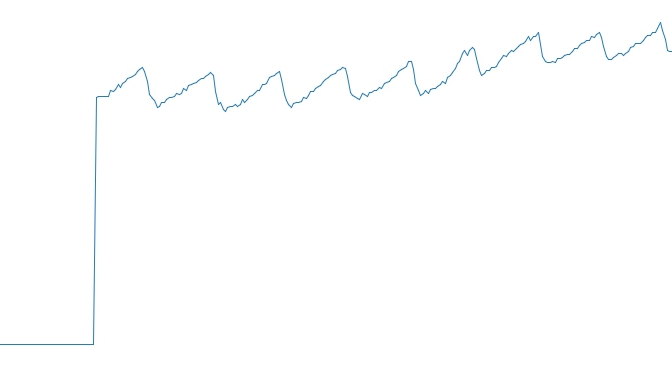
版权归原作者 月照银海似蛟龙 所有, 如有侵权,请联系我们删除。